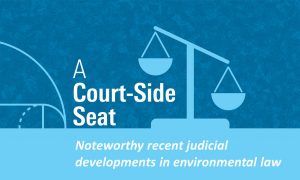The last few weeks have yielded a number of interesting developments in the Federal courts.
FEDERAL COURTS OF APPEAL
In re Flint Water Cases
Several local and State of Michigan officials, including the former governor, requested dismissal from the civil litigation seeking damages for the massive failure of Flint, Michigan’s public drinking water system. On August 5, 2020, the U.S. Court of Appeals for the Sixth Circuit agreed that the plaintiffs, residents of Flint, have successfully pled a case that the conduct of the defendants so “shocked the conscience” that a claim for a violation of their substantive due process rights was appropriately alleged. The defendants, including the former governor, argued that they were entitled to a qualified immunity defense. The court rejected this argument on the basis of the earlier decisions made by the court in this matter. Judge Sutton concurred because he was bound by this precedent, but remarked that the evidence for the governor’s culpability was very thin; he was not intimately connected to the extraordinary error in judgment. The majority was very upset with this concurrence as indicted by their own opinion.
The Parish of Plaquemines v. Chevron USA, et al.
Many oil companies that have conducted oil and gas exploration and production operations along the Louisiana coast for many years have been sued in state court for the environmental damages allegedly resulting from these activities. On August 10, 2020, the U.S. Court of Appeals for the Fifth Circuit decided a case filed in 2013 pursuant to state law, the Louisiana State and Local Coastal Resources Management Act of 1978. The defendants sought to have these cases removed to federal court, but the federal district courts in the Eastern and Western districts denied relief. The defendants appealed to the Fifth Circuit, which has now affirmed the lower courts. The appeals court held that the defendants failed to adhere to the short-term deadlines for filing such removals as set forth in the removal statute, 28 USC Section 1446(b).
Kansas Natural Resource Coalition v. U.S. Department of the Interior
On August 24, 2020, the U.S. Court of Appeals for the Tenth Circuit decided this Administrative Procedure Act (APA) case involving the Congressional Review Act (CRA), which provides Congress with authority to reject regulations issued by the federal agencies. The plaintiffs, an organization of county governments in western Kansas, are concerned with Endangered Species Act (ESA) plans to protect the Lesser Prairie Chicken, a species that has, from time to time, been accorded the protections of the Endangered Species Act. Here, the plaintiffs filed a petition with the district court seeking an order by which the Department would be obliged to submit to the Congress, in accordance with the Congressional Review Act, its rules regarding the department’s evaluation of conservation efforts in connection with ESA listing determinations. These 2003 rules were never submitted to the Congress despite the clear requirements of the CRA, and without the benefit of these rules, the petitioners apparently believe that any new listing decision will be inadequate. However, as recognized by the courts, the CRA also contains a provision forbidding the courts to review “any omission” covered by the CRA. Because this failure could be described as an “omission,” this unique litigation was dismissed.
FEDERAL DISTRICT COURTS
Natural Resources Defense Council, et al. v. U.S. Department of the Interior and the U.S. Fish and Wildlife Service
On August 11, 2020, the U.S. District Court for the Southern District of New York decided this case involving the Migratory Bird Treaty Act (MBTA) and the department’s revised interpretation of the Act’s “incidental take” provisions. As stated by the court, in December 2017, the Principal Deputy Solicitor of the department issued a memorandum “renouncing almost fifty years of the agency’s interpretation of these provisions.” According to this opinion, “the MTBA does not prohibit incidental takes or kills because the law applies only to activities specifically aimed at birds.” The court held that this new opinion was contrary to the plain and straightforward meaning of the MBTA, and controlling Second Circuit precedent (U.S. v. FMC Corporation, 572 F.2d 902 (1978)). The Second Circuit held that Section 2 of the MBTA was a strict liability provision, and the district court vacated the department’s opinion. The department argued that the court need only apply “Skidmore” deference to uphold the law, but the court was not persuaded. The court also attempted to distinguish a contrary ruling of the Fifth Circuit (see U.S. v. CITGO Petroleum Corp., 801 F. 3d 477 (2015), and there may now be a circuit split that the Supreme Court will review.
Center for Biological Diversity v. Bernhart, Secretary of the Interior
On August 20, 2020, the U.S. District Court for the District of Columbia reviewed he ESA status of the “Houston Toad.” The Houston Toad resides only in Texas, but does not appear to be present in the Houston area. In 1984, the Fish and Wildlife Service issued the “Houston Toad Recovery Plan” which has not been updated although the Act was revised in 1988. The plaintiff seeks to “prevent the U.S. Fish and Wildlife Service from leapfrogging the ESA’s current mandates” in its efforts to protect this species. While the agency admits the current plan does not satisfy the criteria set forth in the 1988 revisions, it argues the plaintiff is seeking to litigate the 1984 plan and it is too late to do so now. The court rejected these arguments, and the department’s contention that the controlling statute of limitation requires dismissal. The court held that, because the revised ESA had not been followed, there was a continuing violation of the law, and the statute of limitations does not apply.
RELATED ARTICLES
A Court-Side Seat: Citizen Suits, “Facility” Management and Some Nuance for Your Hazard Ranking
 Gravel2Gavel Construction & Real Estate Law Blog
Gravel2Gavel Construction & Real Estate Law Blog



